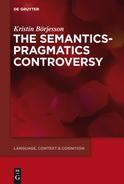Acknowledgements
This book grew out of my doctoral thesis, during the writing of which I was supported in different ways by various people that I would like to thank. First of all, my thanks go to Johannes Dölling for suggesting the topic to me and supervising my thesis. I have profited greatly from his assiduous comments and the various suggestions he made. I would also like to thank Anita Steube and Robyn Carston who kindly agreed to act as examiners of the thesis. It was due to Anita Steube’s initiative that I was enabled to turn my thesis into the actual book within the Language, Context and Cognition series. I am grateful for that. Robyn Carston provided a range of valuable comments on my thesis, which lead me to review and integrate some more recent (mostly relevance-theoretic) literature on the subjects in question.
I started out working on my thesis in the Graduate School Universality and Diversity: Linguistic Structures and Processes at the University of Leipzig. I would like to thank the people involved in the Graduate School for making the three years I spent there a memorable time, especially my colleagues Christiane Kaden, Antje Lahne, Matthias Irmer, Susann Zschernitz, Sonja Fleischhauer, Barbara Sonnenhauser, Petra Augurzky, Andreas Bulk, Olav Müller-Reichau, Torsten Andreas, Petr Biskup, Helena Trompelt and Stefan Sudhoff.
I continued to develop my thesis while working first at the Institute for German at the TU Braunschweig and later at the Institute for English and American Studies at the FAU Erlangen-Nürnberg. I would like to thank Martin Neef (TU Braunschweig) and Thomas Herbst as well as Brigitta Mittmann (both FAU Erlangen-Nürnberg) for making me feel at home at these two institutions, despite the amount of travelling involved. The final phase of this thesis I was able to concentrate on back in Leipzig, for which possibility I am very much indebted to Gereon Müller.
Finally, I want to thank my mother Christine for the continuous support she gave, not only during the time it took me to write my thesis. Especially the last year, working on the thesis would not have been possible if it had not been for her looking after her (then) youngest grandson. At the risk of sounding trite, last but not least, my thanks go to Christian for supporting me and always keenly providing examples of how literal/non-literal meaning and various types of ambiguity are exploited, especially for humorous purposes.
